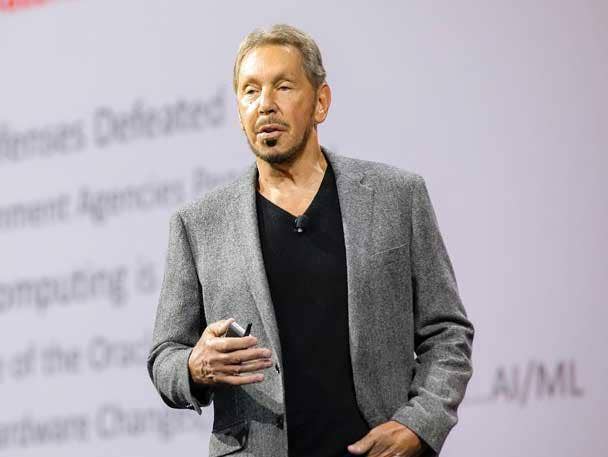Oracle’s Larry Ellison Hits AWS On Cost, Security As He Pounces On Rivals
“We don’t think an application should talk to five or six separate databases,” Oracle co-founder and CTO Larry Ellison says about Amazon’s database offerings. “We think it’s a very, very risky security architecture.”

Oracle is superior to No. 1 cloud provider Amazon Web Services when it comes to security and cost, Oracle Chief Technology Officer and co-founder Larry Ellison told investors Monday.
Ellison once again used the company’s quarterly earnings call to attack his company’s competition, criticizing SAP’s enterprise resource planning offerings and the cloud offerings of Google, Microsoft and especially Amazon.
“We don’t think an application should talk to five or six separate databases,” Ellison said, referencing AWS’ database offerings. “We think it’s a very, very risky security architecture.”
Referencing a recent report from research firm Gartner that put Oracle’s cloud ahead of Google Cloud in terms of capabilities, but still behind Amazon and Microsoft’s cloud offerings, Ellison said that he believes Oracle’s cloud is superior to Amazon, Google and Microsoft’s cloud offerings based on security, cost and other factors.
“That’s been the big question out there -- was our cloud good enough to compete with Amazon and Google and Microsoft,” Ellison said. “And I think we have answered those questions, it’s not only good enough to compete. In many cases, it’s much better for security, for performance, for reliability. For cost -- we’re cheaper. And that’s one of the reasons we have such a big ISV business. And why so many people have left Amazon and gone to the Oracle Cloud is because we cost less. So we have significant cost advantages, And I think this is another big step to proving that the Oracle Cloud is part of the Big Four.”
Representatives from SAP, Microsoft and Google did not respond to requests for comment from CRN. An Amazon spokesperson did not immediately provide comment.
He called Oracle and subsidiary NetSuite “the very first cloud company of any kind” and Oracle “the overwhelming market leader in the global cloud ERP market” on the call with analysts Monday.
Ellison said that what SAP offers customers “is not the cloud” and “does not have a product” that can compete with Oracle’s ERP offerings, resulting in Oracle “taking a lot of their customers away.”
[RELATED: Oracle’s Larry Ellison Launches Fresh Attacks On SAP And AWS]
“As demand for those systems increases, we really don’t have a lot of competition -- that’s the understatement of the year -- in cloud ERP,” he said. “ I’d love to know who the competitors are. SAP does not have a product.”
He continued: “They have hosting. They’re willing to put a custom computer in Amazon and just build a specialized version for the customer. That’s not the cloud. We update our application every three months, 8,000 Fusion customers. 28,000 NetSuite customers updated every six months. SAP will update in five years. It’s an on-premises system. They don’t have a cloud system. We’re winning every deal against them. Every one. And we’re taking a lot of their customers away.”
Sri Ayyeppen, chief revenue officer at Plano, Texas-based Oracle partner Argano, said he is pleased by the investments Oracle has made in its cloud offerings. To him, Oracle excels in storage capabilities.
“Scaling their customer base as well as adding super capabilities that support how customers think about generating more value with cloud has been very pleasing,” Ayyeppen said. “That‘s all helping our business.”
He said he’d like to see more go-to-market support for partners from Oracle and that partners help educate customers on the value Oracle’s cloud and database products can provide.
“Sometimes it’s that education that lacks in the front lines,” he said. “If those can come to the front line and people understand the value, I think the value is delivered.”
Ellison said that customers migrate database workloads to Oracle’s cloud when they compare its cloud to competing ones.
The company reported that Crunch Mediaworks, a provider of intelligent video optimization technology, is moving “their entire video optimization services from AWS to Oracle Cloud Infrastructure” and that Market Rithm, a maker of cloud-based marketing automation software, “believes that moving their entire platform from AWS to Oracle Cloud Infrastructure will save them 30 percent, support their growth, and provide their customers with strong security,” according to Oracle.
“If they come and look and they run -- if they do a comparison, a straight up comparison -- us, Google, us, Amazon, they test the application in both places, we win all of those,” Ellison said. “It‘s when they don’t come and look that we have a problem.”
Ellison said that Oracle will make its Heatwave parallel processing query engine available on other public clouds soon and compete with other database offerings on the market.
He said Oracle’s MySQL is 100 times faster than Amazon Aurora for query processing -- calling Aurora “terrible” for query processing -- and more than 10 times faster than Amazon RedShift or Snowflake for query processing.
“We plan to make Oracle MySQL with Heatwave available on other public clouds in addition to the Oracle public cloud and compete aggressively where we have huge technical advantages over Amazon Aurora, Amazon Redshift and -- perhaps most interestingly -- huge technical advantages, performance and cost over Snowflake.”
For Oracle’s first quarter of fiscal year 2022, a quarter that ended Aug. 31, the company reported total sales of $9.7 billion, up 4 percent year over year. About 76 percent of those sales for for cloud services and license support. The $7.4 billion received for cloud services and license support is a 6 percent increase year over year.
Oracle’s cloud license and on-premises license sales fell 8 percent year over year to $813 million, representing 8 percent of total sales during the quarter.
The company’s infrastructure-as-a-service and software-as-a-service cloud businesses were more than 25 percent of total sales with an annual run rate of $10 billion, according to an Oracle statement.